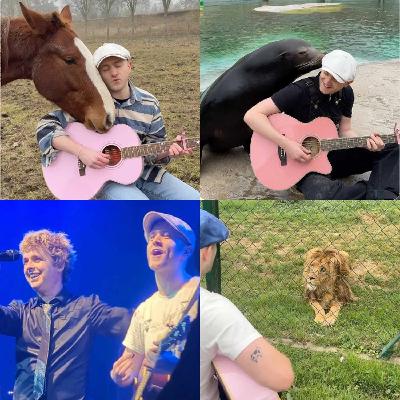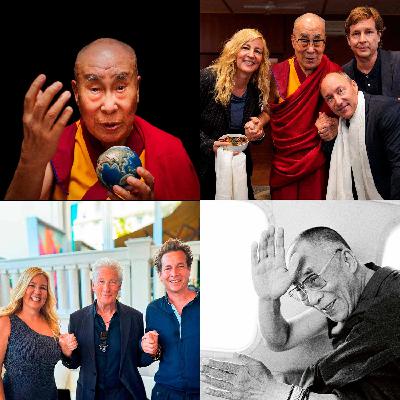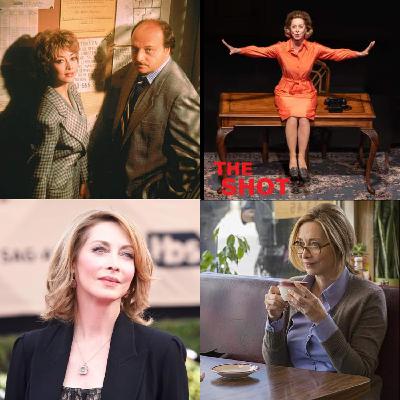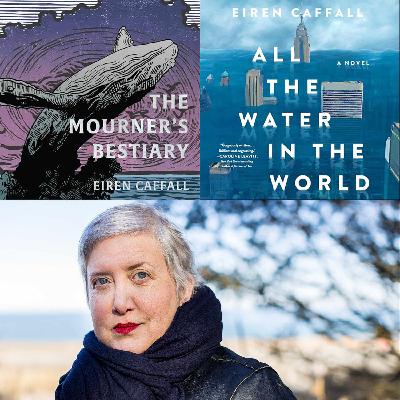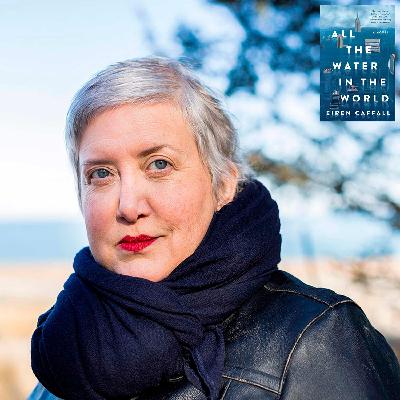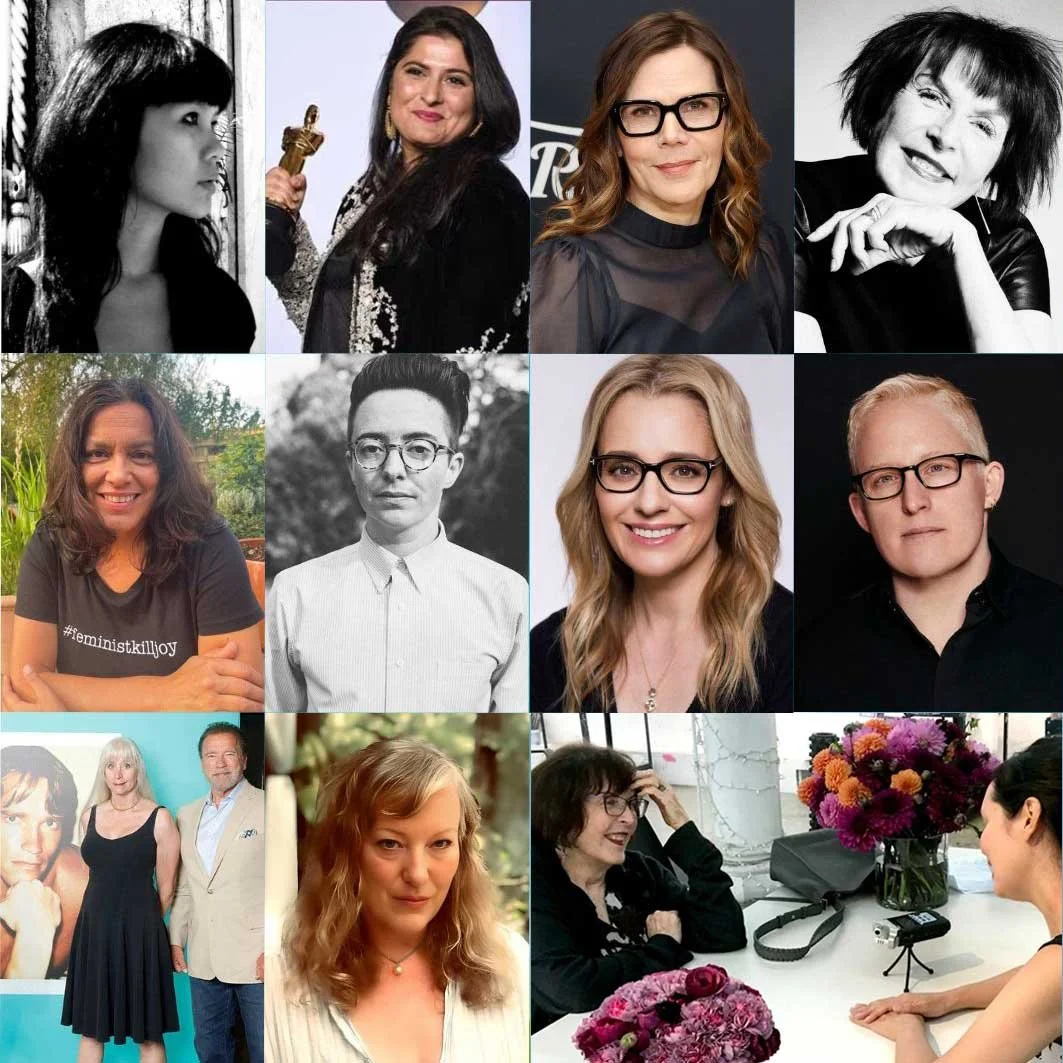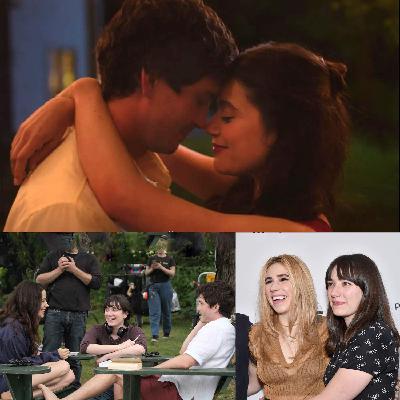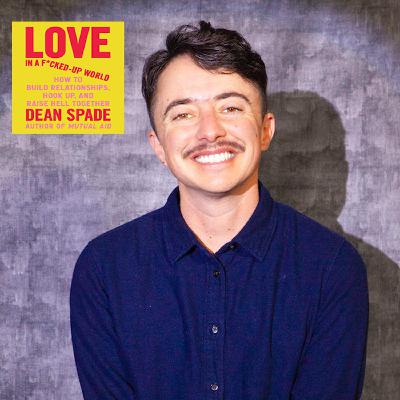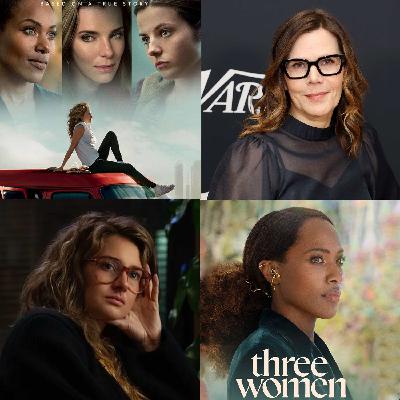Discover LOVE - What is love? Relationships, Personal Stories, Love Life, Sex, Dating, The Creative Process
LOVE - What is love? Relationships, Personal Stories, Love Life, Sex, Dating, The Creative Process

LOVE - What is love? Relationships, Personal Stories, Love Life, Sex, Dating, The Creative Process
Author: Mia Funk
Subscribed: 7Played: 78Subscribe
Share
© Copyright 2023, The Creative Process - LOVE also contains interviews previously recorded for The Creative Process exhibition and educational initiative.
Description
What is love? Relationships, Personal Stories, Love Life…Notable Creatives & Real People discuss love in all its forms. We hear from filmmakers, artists, musicians, environmentalists, NGOs, and explorers about what they love. This season, we’ll also be sharing your reflections on LOVE. Tell us about what you love, as well as your reflections on what love is, why we need it, why it escapes us, and how we can hold onto it. Publish your story alongside our interviews with Oscar, Emmy, Tony, Nobel, Pulitzer Award-winning Artists, Museums & International Organizations on WWW.CREATIVEPROCESS.INFO
To appear in our podcast, submit your story on: www.creativeprocess.info/lovestory
58 Episodes
Reverse
"Within society, we seem to have separated the arts out, so they're not so much a part of our daily lives. Often there's something that we feel we should do as a kind of leisure activity or hobby if we have enough time or if we have enough money to engage in them. And this is so fundamentally different to how humans engaged with the arts. When we look back thousands of years, it just was part of the everyday, and I feel like that's a major loss within contemporary societies."Daisy Fancourt is a Professor of Psychobiology & Epidemiology at UCL and the author ofArt Cure: The Science of How the Arts Transform Our Health. A pioneer in the field of psychoneuroimmunology, she directs the WHO Collaborating Center on Arts and Health, where her research influences global health policy and the integration of the arts into medical care.(0:00) The Healing Power of the Arts: Longevity, Immunity & Wellbeing(1:17) Singing to Daphne: How Daisy used singing to comfort her premature daughter in the ICU(2:47) The Story of Russell: How a stroke survivor used art classes to reclaim his life, health, and identity(5:23) A Planet of 8 Billion Artists: Tracing the evolutionary origins of creativity back 40,000 years(8:58) Psychoneuroimmunology. Defining the biological mechanisms: how art reduces inflammation and cortisol(12:42) Art & Longevity. How arts engagement can slow biological aging and alter gene expression(18:24) Safeguarding Creativity. Why we should use AI for routine tasks but protect the human joy of the creative processEpisode Websitewww.creativeprocess.info/podInstagram:@creativeprocesspodcast
In this special edition, we hear from our guests from across the arts and sciences. From composers and poets to forest ecologists and climate envoys, they tell the story of our planet. Moving beyond the data of destruction, we explore the intelligence of nature, the ethics of what we eat, and the empathy required to save our future.MAX RICHTER, Composer, Sleep, The Blue NotebooksCARL SAFINA, Author, Becoming WildADA LIMÓN, 24th US Poet LaureateCYNTHIA DANIELS, Grammy Award-winning Sound Eng.SUZANNE SIMARD, Finding the Mother TreeJOELLE GERGIS, Lead Author, IPCC 6th Assessment RptNOAH WILSON-RICH, CEO, Best Bees CompanyINGRID NEWKIRK, PETA FounderBERTRAND PICCARD, Solar Impulse FoundationDAVID FARRIER, Author, FootprintsKATHLEEN ROGERS, Pres, Earth Day NetworkODED GALOR, Unified Growth TheoryPETER SINGER, PhilosopherGEOFF MULGAN, Another World Is PossibleCLAIRE POTTER, Welcome to the Circular EconomyCHRIS FUNK, Dir. Climate Hazards Car.JENNIFER MORGAN, Special Envoy, International Climate ActionTo hear more from each guest, listen to their full interviews.Episode Website
On Music, Trust and Connection with the Animal World“Mostly I’ll play in a minor key, something sad, which I think can work for an animal because they can sense the sadness, and they try to reassure me and comfort me. I chose love songs because I'm convinced they are very intuitive and they can sense what I am trying to say to them, and profess my love in a way. I think there's always a way to connect, and if you're being cautious and don't threaten the animals, something beautiful can happen.”Musician Plumes takes his guitar to the world's most unlikely concert halls—farms, sanctuaries, and wild habitats. A passionate advocate for veganism and animal welfare, we discuss what animals hear, how trust forms, and what music can reveal when it enters a world not made for humans alone.Episode Websitewww.creativeprocess.info/podInstagram:@creativeprocesspodcast
How is music a pathway to understanding animals?Musician Plumes takes his guitar to the world's most unlikely concert halls—farms, sanctuaries, and wild habitats. A passionate advocate for veganism and animal welfare, we discuss what animals hear, how trust forms, and what music can reveal when it enters a world not made for humans alone.“Mostly I’ll play in a minor key, something sad, which I think can work for an animal because they can sense the sadness, and they try to reassure me and comfort me. I chose love songs because I'm convinced they are very intuitive and they can sense what I am trying to say to them, and profess my love in a way. I think there's always a way to connect, and if you're being cautious and don't threaten the animals, something beautiful can happen.”Episode Websitewww.creativeprocess.info/podInstagram:@creativeprocesspodcast
“I can change my mind. I can reduce anger, hatred. Nothing to do with religion. All religions carry the message of love, loving kindness, and tolerance. With different views, there is a possibility to synthesize new ideas. If majority of the world leaders become female, world become safer. I feel that. Compassion is the key factor. Non-violence, compassion and self-confidence, these are key factors for happy individual, happy community, peaceful world. This century should be century of compassion, century of peace. No more bloodshed. We should develop a big “we,” rather than “we” or “they.” With these wings, you can fly.” -DALAI LAMAFor decades, the Dalai Lama has been a global symbol of peace, compassion, and resilience, a spiritual leader living in exile from his home in Tibet. But how do you capture the essence of his wisdom—the kind that can truly change a life—in a way that feels intimate and personal? My guest today, documentary filmmaker Barbara Miller, has managed to do just that in her new film, Wisdom of Happiness. It’s a beautiful film that feels less like a documentary and more like a private, heart-to-heart conversation, where he invites us into his thoughts and shares practical steps for finding inner peace in a chaotic world. She's dealt with anti-globalization, domestic violence, and the fight for female pleasure in her previous works. We’ll talk about how she shifted from exposing systemic pain to focusing on radical hope and her collaboration with Executive Producer Richard Gere and Manuel Bauer, the Dalai Lama’s personal photographer for the last thirty-five years, who made his cinematography debut with this film. She shares what the Dalai Lama taught her about living in harmony with our body, nature, and the world.Episode Website www.creativeprocess.info/podInstagram:@creativeprocesspodcast
“ Everybody wants happiness, joyfulness, peaceful world. Our 21st century will not be easy century. Fear, anger, hatred. In our mind we created distinctions. Different nationality, different color, different religion. Strong concept of “we” and “they”. Brothers and sisters of this small planet, we are same human beings. Meanwhile, global warming is a serious problem. Destruction of this planet is actually destruction of yourself. Our common responsibility should be work together, to save our world. We all have this marvelous human brain. The problem is, when negative emotions develop, our whole mind is taken over. So, we must deal with emotions.I can change my mind. I can reduce anger, hatred. Nothing to do with religion. All religions carry the message of love, loving kindness, and tolerance. With different views, there is a possibility to synthesize new ideas. If majority of the world leaders become female, world become safer. I feel that. Compassion is the key factor. Non-violence, compassion and self-confidence, these are key factors for happy individual, happy community, peaceful world. This century should be century of compassion, century of peace. No more bloodshed. We should develop a big “we,” rather than “we” or “they.” With these wings, you can fly.” -DALAI LAMAFor decades, the Dalai Lama has been a global symbol of peace, compassion, and resilience, a spiritual leader living in exile from his home in Tibet. But how do you capture the essence of his wisdom—the kind that can truly change a life—in a way that feels intimate and personal? My guest today, documentary filmmaker Barbara Miller, has managed to do just that in her new film, Wisdom of Happiness. It’s a beautiful film that feels less like a documentary and more like a private, heart-to-heart conversation, where he invites us into his thoughts and shares practical steps for finding inner peace in a chaotic world. She's dealt with anti-globalization, domestic violence, and the fight for female pleasure in her previous works. We’ll talk about how she shifted from exposing systemic pain to focusing on radical hope and her collaboration with Executive Producer Richard Gere and Manuel Bauer, the Dalai Lama’s personal photographer for the last thirty-five years, who made his cinematography debut with this film. She shares what the Dalai Lama taught her about living in harmony with our body, nature, and the world.Episode Website www.creativeprocess.info/podInstagram:@creativeprocesspodcast
“I would encourage you, as I do if you're an actor, to know your own equipment, know your own psychology, and use the great teachers that are synthesized in my favorite teacher's book, Moss, who I studied with later. There is a book called Intent to Live that distills down Uta Hagen, Stella Adler, Bobby Lewis, and Stanislavski. The great teachers at the Group Theatre believed that the method needed to be altered to be constructive rather than destructive to artists.David Milch's mind is so singular because he uses language in a way that defines character. That's what all good writers do: use language to get to the heart of something. He would use malapropisms to make up words, and Milch loved playing with that. As someone who played the love interest of such a unique character as Andy Sipowicz, I found it fascinating.Through Sylvia and David Milch's understanding, his wife humanized him. Sipowicz was portrayed as an addict, a very flawed human who had many addictions. David Milch is now suffering from Alzheimer's, so we won't get his words again. However, the words that he has to offer are timeless because he studied Robert Penn Warren and had many mentors throughout his vast literary education. That is key. I love speaking Noël Coward’s words. As a bon vivant, he wrote musically, to charm us and amuse us. So going and reading Noël Coward is important for actors to learn those cadences and the musicality of a certain era. Of course, Shakespeare comes to mind. I also think of the female playwrights who delight me now, whether it's Caryl Churchill. She has that singular mind and plays with gender so well, challenging gender norms. Seeing ‘Cloud Nine’ when I was in college blew my mind open because men were playing women and women were playing men. Of course, Shakespeare was doing it too, but her work felt more intimate; it was in a small theater. That’s another thing I encourage actors and audiences to do: go see things in small theaters. See it up close because that will excite you and help you learn the craft.”Sharon Lawrence is an acclaimed actress best known for her Emmy-nominated, SAG Award-winning role as ADA Sylvia Costas on NYPD Blue. She has delivered memorable performances in Desperate Housewives, Monk, Law & Order: SVU, Criminal Minds, Shameless, and Queen Sugar. On stage, she’s earned praise for roles in The Shot (a one-woman play about the owner/publisher of the Washington Post, Katharine Graham), Orson’s Shadow, and A Song at Twilight. Shestarred in Broadway revivals of Cabaret, Chicago, and Fiddler on the Roof. Her recent work includes the neo-Western series Joe Pickett, opposite Michael Dorman, and the films Solace with Anthony Hopkins and The Bridge Partner. Lawrence is also a dedicated advocate, serving on the boards of the SAG-AFTRA Foundation, WeForShe, and Heal the Bay, and is a former Chair of the Women In Film Foundation.Episode Websitewww.creativeprocess.info/podInstagram@sharonelawrence@creativeprocesspodcast
“I think that it all goes back to childhood. I’ve always really been writing about family. I suppose we always are. I do think that it is the original wound, and it's where we are kind of wired and built from those early years. So I think every other relationship just replicates that. It's very natural for me to go there, I suppose because the feelings are most intense there. We just keep recycling these relationships and dynamics over and over again—until maybe someday we can catch ourselves and try to break the bad patterns. It feels the most visceral and real to me, always. You're always looking for that in writing. You want everything to be at this peak intensity, or at least I do. That seems the most natural place to start.I've thought about that a lot while writing the book. We really are in the age of the grifter, as they keep saying. In some ways, it's the most deeply American type, the hustler of American aspiration. And money, I think that was hovering in my head when I wrote the book. How women persuade and convince one another of things feels particularly complex to me. I think there are so many layers to female relationships. That was really interesting to me to pursue because, in some ways, it's much more veiled and complex. So I tend to write about groups of women a lot, regardless of the field, but particularly the way they communicate or don't communicate, or communicate without words to one another, is an ongoing fascination of mine.”Megan Abbott is the Edgar award-winning author of twelve crime novels, including Beware the Woman, You Will Know Me, Give Me Your Hand, and the New York Times bestseller The Turnout, the winner of the Los Angeles Times Book Prize. She received her Ph.D. in English and American literature from New York University, and her writing has appeared in the New York Times, the Guardian, the Paris Review and the Wall Street Journal. Dare Me, the series she adapted from her own novel, now streaming on Netflix. Her latest novel, El Dorado Drive, is available June 24, 2025.Episode Websitewww.creativeprocess.info/podInstagram:@creativeprocesspodcast
“The more that you have that evolving relationship with the natural world, that's dynamic and alive to the moment you're in, and that's not afraid of the feelings of fear, hopelessness, grief, or pain that attend paying close attention to the world as it is evolving around you, the better we are able to be flexible in the relationship we need to form with fixing what we can and holding onto what we have. The more we rely on that black-and-white thinking of either being in grief or being out of it, where we have a loss and we have to move on, or we don't and we're fine. The more that happens, the more difficult it is to flow into what we really need in terms of emotional flexibility to get through the staggering changes that are starting to happen regarding climate issues.”Eiren Caffall is a writer and musician. Her work on loss, oceans, and extinction has appeared in Orion,Guernica, The LA Review of Books, Al Jazeera, and the anthology Elementals. She has received a 2023 Whiting Creative Nonfiction Grant, a Social Justice News Nexus fellowship, and a 3Arts Make a Wave grant. Her work includes her memoir The Mourner’s Bestiary, the short film Becoming Oceanthatshe made with Scott Foley, and her novel All the Water in the World.Episode Websitewww.creativeprocess.info/podInstagram:@creativeprocesspodcast
“We are in a complex and delicately balanced relationship of connection to everything else on the planet. We begin to recognize, write into, and speak into the complex interdependence and interconnection of every gesture that we make on the planet. Most storytelling that I really respond to, whether it's from my own culture or from previous civilizations, acknowledges that we are in this complex relationship where every gesture we make is connected to the lives of every other creature on the planet. The more narratives we allow to be complex in that way and interconnected, the more we begin to change our brain chemistry around how we protect ourselves and everything that is in relation to us. The more that you have that evolving relationship with it, that's dynamic and alive to the moment you're in, and that's not afraid of the feelings of fear, hopelessness, grief, or pain that attend paying close attention to the world as it is evolving around you, the better we are able to be flexible in the relationship we need to form with fixing what we can and holding onto what we have.”Eiren Caffall is a writer and musician. Her work on loss, oceans, and extinction has appeared in Orion, Guernica, The LA Review of Books, Al Jazeera, and the anthology Elementals. She has received a 2023 Whiting Creative Nonfiction Grant, a Social Justice News Nexus fellowship, and a 3Arts Make a Wave grant. Her work includes her memoir The Mourner’s Bestiary, the short film Becoming Ocean that she made with Scott Foley, and her novel All the Water in the World.Episode Websitewww.creativeprocess.info/podInstagram:@creativeprocesspodcast
“I want to live a life of consequence, and I want to live a life that has stakes in it because that means that things matter to you. I think, in some ways, this memoir was a project of sifting through and excavating the darkest hours, both for me and for the lineage and ancestry that I came from. I think the darkest hours were experienced by so many people I come from who have had to leave places they didn't want to leave. I live in exile and have been forced to leave behind houses, land, cities, and people. Oftentimes, this has happened more than once in a lifetime, so they have carried that trauma. Of course, it plays out intergenerationally in many different ways.I think it's a time of fear. I don't think I'm alone in that. I am scared for people that I love. I am scared for people who are quite vulnerable. I worry for my students. I am concerned for the places that I feel are engaging in complicity because that will be such a heavy legacy to endure later on, how people, places, and entities comport themselves in moments like this. They will be remembered. There will always be people who remember it.”Hala Alyan is the author of the memoir I'll Tell You When I'm Home, the novels Salt Houses—winner of the Dayton Literary Peace Prize and the Arab American Book Award, and a finalist for the Chautauqua Prize—and The Arsonists’ City, a finalist for the Aspen Words Literary Prize. She is also the author of five highly acclaimed collections of poetry, including The Twenty-Ninth Year and The Moon That Turns You Back. Her work has been published by The New Yorker, The Academy of American Poets, The New York Times, The Guardian, and Guernica. She lives in Brooklyn with her family, where she works as a clinical psychologist and professor at New York University.Episode Websitewww.creativeprocess.info/podInstagram:@creativeprocesspodcast
“So, post-activism is not ‘post-activism’ in the sense of being after activism. It is not supposed to be a through line to results or resolutions or solutions.”Dr. Bayo Akomolafe is a philosopher, psychologist, writer, public intellectual, and the founder of the Emergence Network. His work, which he names post-activism, marks an earth-wide effort to sensitize bodies towards new response-abilities and other places of power – a project framed within a material feminist/post-humanist/post-activist ethos and inspired by Yoruba indigenous cosmologies. He is the author of These Wilds Beyond Our Fences: Letters to My Daughter on Humanity's Search for Home.“Post-activism is instead a noticing that the ways we care for ourselves and our causes and our worlds could actually be incarcerated. Another way to put that is to notice that care can often become carceral. I often suggest that we like to embrace things, but sometimes in the squeeze of embrace, it could quickly become asphyxiation, where we choke the air out of each other in trying to care for each other.”Episode Websitewww.creativeprocess.info/podInstagram:@creativeprocesspodcast
“This novel is the third in what I see as a little set of books that all feature unnamed female protagonists who have experienced varying degrees of passivity and agency in their lives. They're all women who speak the words of other people.”Katie Kitamura is the author five novels, most recently Audition and Intimacies, which was named one of the New York Times 10 Best Books of 2021, longlisted for the National Book Award and the PEN/Faulkner Award, and a finalist for a Joyce Carol Oates Prize. She is a recipient of the Rome Prize in Literature, fellowships from the Cullman Center and the Lannan Foundation, and many other honors. Her work has been translated into twenty-one languages. She teaches in the creative writing program at New York University.Episode Websitewww.creativeprocess.info/podInstagram:@creativeprocesspodcast
How has feminism changed in light of the way we live now?DEAN SPADE (Author of Love in a F*cked Up World: How to Build Relationships, Hook Up & Raise Hell Together) on recognizing political conditions in personal relationships.MARILYN MINTER (Artist, Feminist) on sexual agency, beauty & her creative process.TEY MEADOW (Author of Trans Kids: Being Gendered in the Twenty-First Century) on the necessity of creating an inclusive environment & argues that diverse storytelling is crucial for healthy development.ELLEN RAPOPORT (Creator, Exec. Producer of Minx) on the evolution of feminism, the divides that emerged in the 70s over pornography & sex work.LAURA EASON (Emmy-nominated Producer, Screenwriter · Three Women, House of Cards) on the significance of representing ordinary women’s experiences.SHARMEEN OBAID-CHINOY (Oscar & Emmy-winning Director of Diane von Furstenberg: Woman in Charge · Forthcoming Star Wars film) on the legacy of von Furstenberg.SARA AHMED (Author, The Feminist Killjoy Handbook) reclaims the stereotypes, calling for solidarity among feminists.INTAN PARAMADITHA (Author, The Wandering) reflects on the importance of intergenerational knowledge among women.DIAN HANSON (Editor) on participating in the sex-positive movements of the 1960s to creating niche fetish magazines.KATE MUETH (Neo-Political Cowgirls Founder) on the importance of finding meaning in creative work, community & storytelling in human experience.Listen to full interviewsEpisode Websitewww.creativeprocess.info/podIG:@creativeprocesspodcast
“In reality, we're all complex people with feelings and our own sets of baggage. I do think we are very good at self-sabotage, all of us. It's a very easy road to go down. It's safe because it's comfortable, and we know it. When you can find the ways you self-sabotage and try to stop that, it will hopefully lead to a happier life and things that are meaningful. When I was in my late twenties, I got out of a serious relationship and kind of reentered the dating scene. I was shocked by the simplification of a lot of complicated feelings around dating and how women are so easily labeled crazy, and men are so easily labeled assholes.”Sophie Brooks is a London-born, Brooklyn-based writer and director. Her sophomore feature Oh, Hi! premiered at the 2025 Sundance Film Festival. Her debut film, The Boy Downstairs, was acquired by Film Rise and HBO at the Tribeca Film Festival. It was produced by David Brooks, Paul Brooks, and Dan Clifton and stars Zosia Mamet, Matthew Shear, and Diana Irvine.Episode Websitewww.creativeprocess.info/podInstagram:@creativeprocesspodcast
What is love? How do the relationships we have early in our lives affect us for years to come? How can we break free from cycles of damage to form relationships of mutual understanding, respect, and love?Sophie Brooks is a London-born, Brooklyn-based writer and director. Her sophomore feature Oh, Hi! premiered at the 2025 Sundance Film Festival. Her debut film, The Boy Downstairs, was acquired by Film Rise and HBO at the Tribeca Film Festival. It was produced by David Brooks, Paul Brooks, and Dan Clifton and stars Zosia Mamet, Matthew Shear, and Diana Irvine.“In reality, we're all complex people with feelings and our own sets of baggage. I do think we are very good at self-sabotage, all of us. It's a very easy road to go down. It's safe because it's comfortable, and we know it. When you can find the ways you self-sabotage and try to stop that, it will hopefully lead to a happier life and things that are meaningful. When I was in my late twenties, I got out of a serious relationship and kind of reentered the dating scene. I was shocked by the simplification of a lot of complicated feelings around dating and how women are so easily labeled crazy, and men are so easily labeled assholes.”Episode Websitewww.creativeprocess.info/podInstagram:@creativeprocesspodcast
“This book has a lot of the wisdom of things that feminists and queers have learned in the community about sexuality, but the book is really for anybody who is political, even those just starting out and beginning to realize that there is something wrong with the systems they live under. I want to be in movements. Our movements are made of relationships. So, if you're just getting into our movements, or if you've been here for years and have been watching the ways we hurt each other and fall apart relationally, this book is about identifying these common patterns.”Dean Spade is an organizer, speaker, author, and professor at Seattle University's School of Law, where he teaches courses on policing, imprisonment, gender, race, and social movements. He is the author of Mutual Aid: Building Solidarity During this Crisis (and the next) and Normal Life: Administrative Violence, Critical Trans Politics and the Limits of Law. His latest book is Love in a F*cked-Up World: How to Build Relationships, Hook Up, and Raise Hell Together.Episode Websitewww.creativeprocess.info/podInstagram:@creativeprocesspodcast
Why is it that we find the courage to boldly confront mainstream societal norms and structures, yet are so often unable to treat romantic partners with care and generosity? Why do we lose our principles when we become insecure, disappointed, or jealous? Why do we act our worst in sexual and romantic relationships? And why do we prioritize romantic connection above other types of relationships, like friendship?Dean Spade is an organizer, speaker, author, and professor at Seattle University's School of Law, where he teaches courses on policing, imprisonment, gender, race, and social movements. He is the author of Mutual Aid: Building Solidarity During this Crisis (and the next) and Normal Life: Administrative Violence, Critical Trans Politics and the Limits of Law. His latest book is Love in a F*cked-Up World: How to Build Relationships, Hook Up, and Raise Hell Together.“This book has a lot of the wisdom of things that feminists and queers have learned in the community about sexuality, but the book is really for anybody who is political, even those just starting out and beginning to realize that there is something wrong with the systems they live under. I want to be in movements. Our movements are made of relationships. So, if you're just getting into our movements, or if you've been here for years and have been watching the ways we hurt each other and fall apart relationally, this book is about identifying these common patterns.”Episode Websitewww.creativeprocess.info/podInstagram:@creativeprocesspodcast
“I think the show conveys to the women watching that their lives matter. They don't have to be some gorgeous aspirational person, although Sloane absolutely fits that mold. But for others living in the Midwest, struggling and feeling unseen, hopefully, the mirrors of Lina and Maggie will help them not feel so alone and remind them that their stories are important and matter.”Laura Eason is an Emmy-nominated producer, screenwriter, and playwright. Currently, she is the executive producer and showrunner of the Starz drama series Three Women. Based on a book by Lisa Taddeo, the series stars Shailene Woodley, DeWanda Wise, Betty Gilpin and Gabrielle Creevy. Laura’s writing and producing credits for television include The Loudest Voice and four seasons of House of Cards. Laura's many plays include the critically acclaimed Sex with Strangers. She has also adapted many classic novels for the stage, including a highly successful version of Around the World in 80 Days. She has served as Artistic Director of Lookingglass Theatre Company in Chicago, where she also acted, directed, and produced in upwards of 20 shows.Episode Websitewww.creativeprocess.info/podInstagram:@creativeprocesspodcast
What is love? How do the narratives we internalize shape our understanding of relationships, intimacy, and family?Laura Eason is an Emmy-nominated producer, screenwriter, and playwright. Currently, she is the executive producer and showrunner of the Starz drama series Three Women. Based on a book by Lisa Taddeo, the series stars Shailene Woodley, DeWanda Wise, Betty Gilpin and Gabrielle Creevy. Laura’s writing and producing credits for television include The Loudest Voice and four seasons of House of Cards. Laura's many plays include the critically acclaimed Sex with Strangers. She has also adapted many classic novels for the stage, including a highly successful version of Around the World in 80 Days. She has served as Artistic Director of Lookingglass Theatre Company in Chicago, where she also acted, directed, and produced in upwards of 20 shows.“I think the show conveys to the women watching that their lives matter. They don't have to be some gorgeous aspirational person, although Sloane absolutely fits that mold. But for others living in the Midwest, struggling and feeling unseen, hopefully, the mirrors of Lina and Maggie will help them not feel so alone and remind them that their stories are important and matter.”Episode Websitewww.creativeprocess.info/podInstagram:@creativeprocesspodcast




